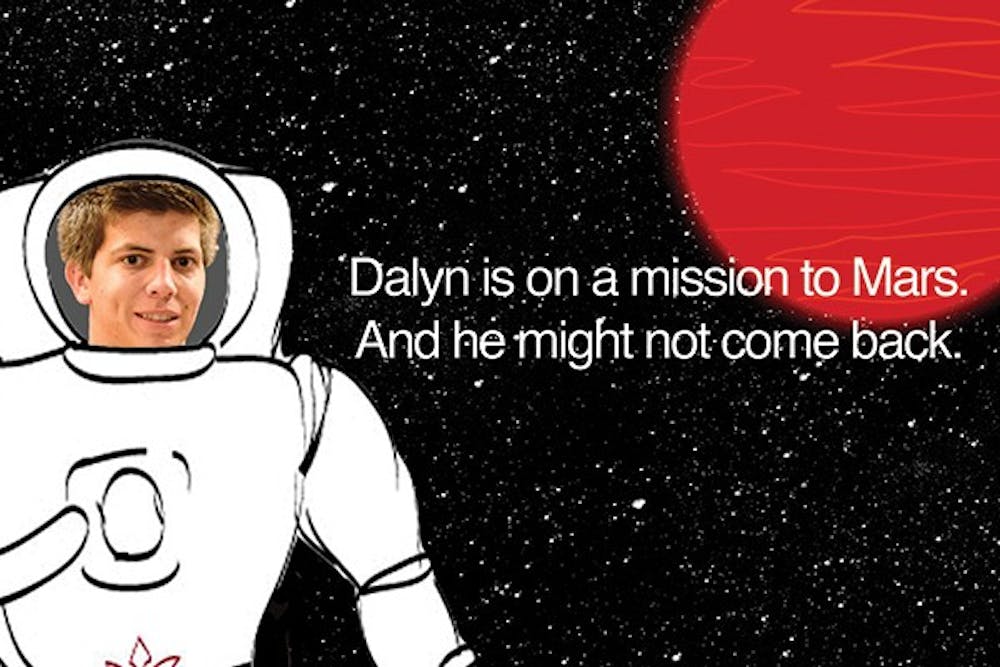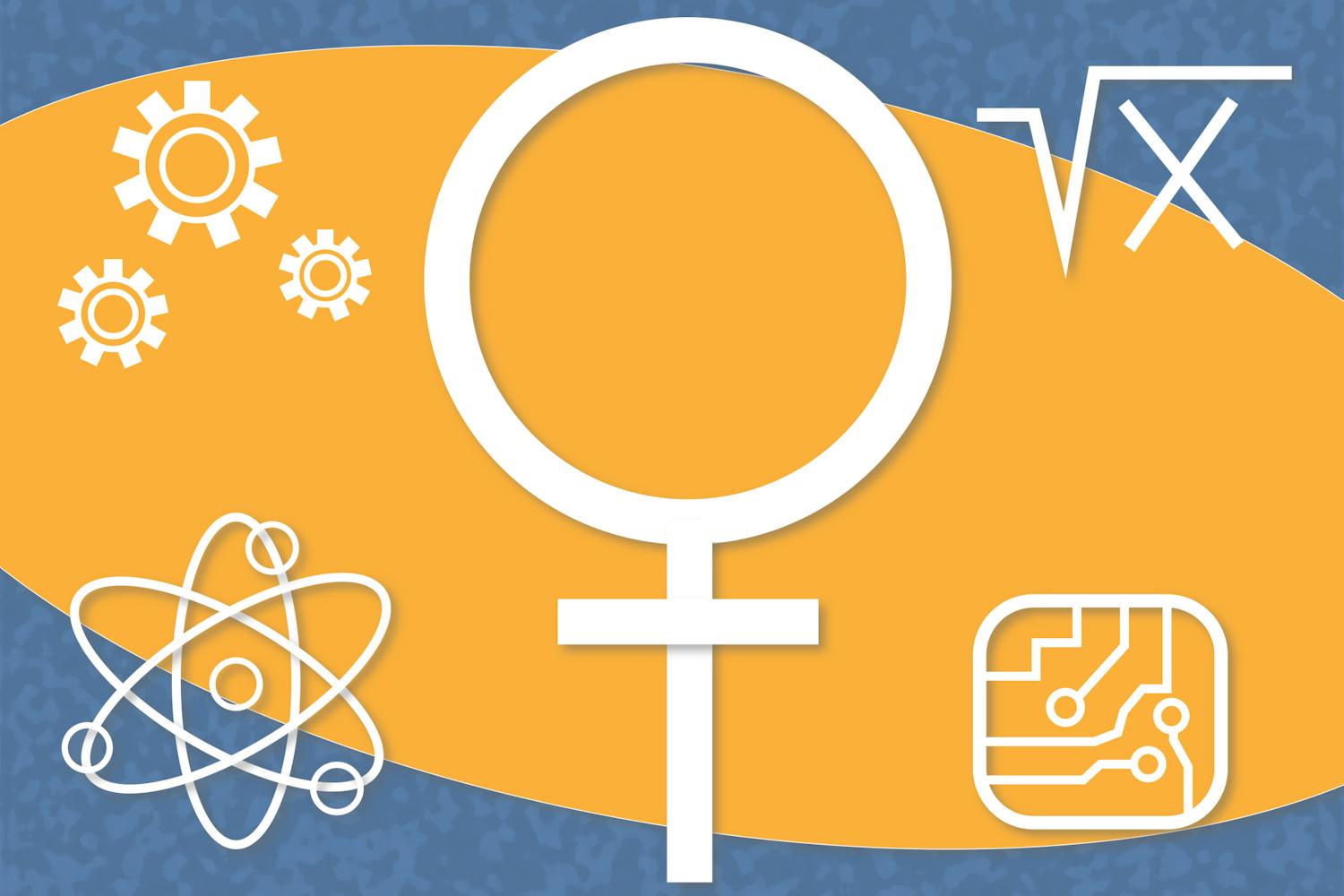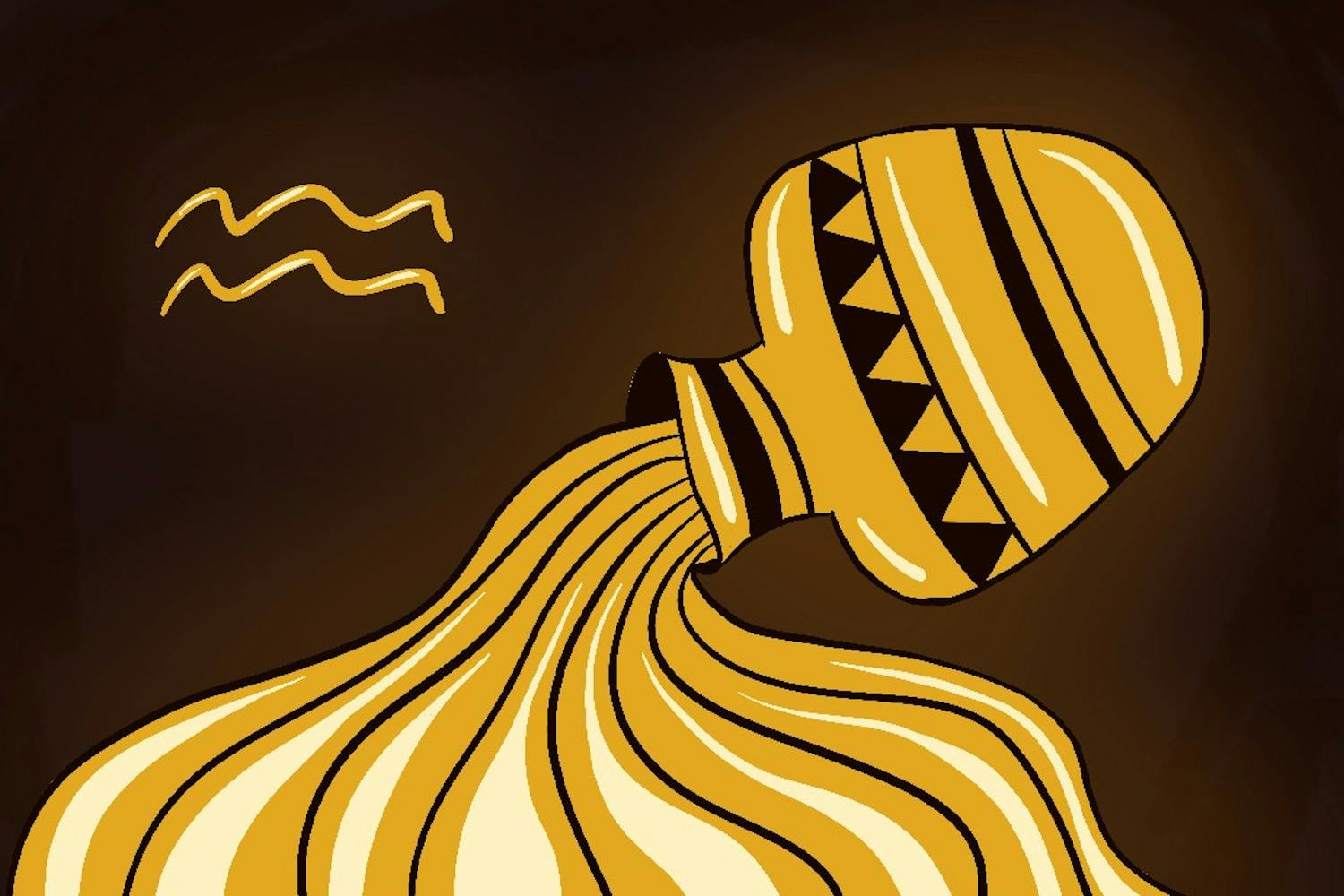 Before signing up, Dalyn Gilbert had to be aware of the possibility of not returning back to Earth once shipped off.
Before signing up, Dalyn Gilbert had to be aware of the possibility of not returning back to Earth once shipped off.Graphic by Thania Betancourt and Noemi Gonzalez
Humanity is wired to explore. We’ve traveled the land, the ocean and relatively recently outer space. All exist not just as a means of living, but as a challenge to be undertaken. Mars may just be the next step in that eternal challenge.
Dalyn Gilbert, an aerospace engineering senior at ASU and a candidate for the Life on Mars mission hosted by Mars One, loves an adrenaline rush.
He describes himself as the type of person to perform acrobatic leaps on a trampoline, longboard down a mountain against traffic or hitch onto the back of a speeding truck while skateboarding.
“If I want to do something, I always do it no matter what the risks are,” he said.
He has harbored a fascination for space since childhood, particularly for Mars. Forever fascinated by the stars, he recalls looking up at them and wanting to see those places for himself.
“I always like finding new things,” Gilbert said.
When he started school at ASU in 2010, he looked around at the different space programs and stumbled upon Mars One. The mission to Mars was only an idea at the time, and Gilbert notes he kept a careful eye on it.
Gilbert sees the mission to Mars as a chance for humanity to prove that they are capable of anything, especially in light of the space program’s slowdown of missions.
“We’ve been on Earth this whole time, and we don’t know what else is out there,” he said.
The part Gilbert is most excited about is the training, as the chosen candidates will be flown up into the lower reaches of space and put through simulations. He wants to learn how to operate the machinery, but does not look forward to any medical training he may need because the sight of blood leaves him weak.
With a two to eight minute delay of communication between Earth and Mars, Gilbert says live conversational ways of keeping in touch would be impractical. Email, texts and recorded video messages are how he plans to stay in contact with his loved ones.
“My dad means the world to me,” he said.
Donovan Gilbert, Dalyn Gilbert’s father, said his first reaction to hearing about the mission was excitement for how his son could achieve his dream of working in space exploration. Though he received a telescope around the age of 10 that he often used, Dalyn’s interest in space exploration was sparked from his love of physics in high school.
“He kept looking into it, studying it, trying to figure out what kind of job would be most like… using physics,” Donovan Gilbert said. He helped Dalyn choose his college major based on the criteria that it offered the most physics classes.
His father recalled that Dalyn has possessed a wild streak since he was five, performing difficult skateboard tricks. He continued his antics in Little League Baseball, which necessitated a trip to the doctor after an attempt to steal home plate landed him unconscious.
“Something very crazy all of a sudden… is definitely his style,” he said.
If his son leaves, Donovan Gilbert said he will most miss Dalyn's relaxed approach to life, calling him the greatest thing to ever happen to him.
“He’s shown me exactly who I am,” he said. “I couldn’t have figured it out without him.”
Donovan Gilbert does think about what his son will go through on Mars, and conversely, what he will miss out on back on Earth.
“I want to see him grow up, I want to see him get married, I want to see him prosper,” he said.
Donovan Gilbert worries not only about the fact his son won’t receive a paycheck for his work living on Mars, but also about the lack of government supervision in the Life on Mars project. He does not think a private corporation is as obligated to hold themselves to high safety standards.
“(Dalyn) doesn’t seem to care about that,” he said. “He wants a way to get to Mars… but then he also thinks he’s going to find a way to come back.”
Aside from his family and friends, the things Dalyn Gilbert said he would miss most about Earth would be access to new music and soda.Though there’s nothing he’s looking to get away from, with all of Earth’s tragedies Gilbert sees a trip to Mars as a reprieve.
“Just nice to get away from all the chaos happening on Earth,” he said.
There is nothing he wishes to take with him to the red planet but he wants to leave behind a legacy on Earth worth remembering and not be forgotten.If and when he steps onto Mars, Gilbert said he will be ready with a statement that encapsulates the planet to tell those back on Earth what the photos can’t capture.
“I have quite a lot of time to think of a good quote to have coming out of the space ship,” he said.
A friend of Gilbert’s, business senior Gabriel Villa, suggested he start a Facebook page dedicated to getting him to Mars. Though he created the page, Villa currently runs it, acting as his agent.
Gilbert also contacted ABC15 on its Facebook page to ask if the station would be interested in interviewing him, which it was. He added that he approached Channel 15 to be remembered and associated with the word “Mars.” Part of the interview is quoted in his entry video.
Villa noted Gilbert’s dreams of going into space date back to high school. He updates Gilbert’s Facebook page not only with links to articles concerning Gilbert but also with random Mars facts.
The craziest thing Villa said Gilbert has done before this was on a return trip from camping in Flagstaff.Gilbert stopped the group to go longboarding down a hillside road, was nearly run over by a car on his trip down and landed in a cactus.
Villa feels there is no one thing he would miss if his friend left, as he would miss everything about Gilbert. To him, Gilbert i snot only a good friend but someone who makes exciting things happen.
“He’s definitely the guy you want at your party and the guy you want to be around,” Villa said.
Dalyn is not the only one who will need to overcome obstacles if he wants to reach Mars.
The biggest obstacle facing the Mars One project is the amount of dangerous radiation present on the way to Mars and on the planet itself, said Jack Farmer, a professor at the ASU School of Earth and Space Exploration. The trip to Mars alone would accumulate radiation equal to the amount an average human would receive in a lifetime.
“At this point, I think it’s a risky venture,” Farmer said.
Stationing habitats not too far underground on Mars could protect candidates from surface radiation, but any time spent exploring the surface would still be time spent exposed to radiation, he explained. No one would want to be out in that, much like people avoid the heat wave of an Arizona summer.
Radiation shielding on a spacecraft could help protect its passengers, but the shielding required is expensive, Farmer added.
“The bottom line is, radiation is a big deal,” he said.
Muscle atrophy and bone loss after months of weightlessness in transit is another risk for those making the journey to Mars, Farmer explained.
 Sun Devil Dalyn may soon become your favorite Martian.
Sun Devil Dalyn may soon become your favorite Martian.Graphic by Thania Betancourt and Noemi Gonzalez
“You don’t want to send astronauts to Mars and have them walk off the spacecraft and fall down because they can’t support their own weight,” he said.
His ideal candidate for the mission would have to have to be in top physical fitness, handle stress and risks well and maintain emotional stability on a long-term mission.
“Some people might flip out after a few months,” he said. “People adapt differently, and some people are more suited for a long duration.”
Farmer believes human exploration of Mars is necessary because humans do a better job than robotics, and it is inevitable because humans are naturally driven to explore even when it’s not necessary.
“Could there be a practical reason to want to go off world and live on Mars at some point?” he asked. “There are lots of scenarios that have been created in science fiction that say humans have to leave Earth at some point to go to another planet to survive. Well, you know, is that going to be the case? I don’t know, maybe. But I doubt it.”
The best reason to send humans could be deep subsurface drilling to learn if there is water underground. Farmer explained robotic drilling has not worked in the past as the robots did not have the quick thinking needed to solve problems in real time, adding it takes time for anything robotic on Mars to follow orders because of the communication lag between planets.
“It can take sometimes months to do what a human can do in a few hours,” Farmer said.
If there is water hidden beneath Mars’ surface, it is possible there is also flourishing microorganisms within it, he said.
“We need to know, are we alone in the universe?” he said. “Even if it’s just a lowly microbe, that’s a big step.”
If life is discovered on Mars, Farmer said it could not only be studied but used to solve problems found on Earth.
“The field of biotechnology will intervene and say, ‘Wow, there’s some really interesting organism on Mars that makes enzymes that can do something that we really need to have done on Earth,’” he said.
Farmer said pathogens, which are microorganisms that cause disease, evolve in tandem with native organisms, so it’s unlikely that anything found on Mars could harm an Earth organism. But organisms brought back could be ecologically destructive, competing with and displacing terrestrial life forms (to wit, the Martian flu is out, but pond bacteria might be in trouble).
The exploration team could also examine Mars’ fossil records for answers to Mars’ past.The red planet could have been more Earth-like in the past, which means the best hope of finding evidence of extinct life forms is to look in rocks, Farmer said.
“I call that activity exopaleontology,” he said. “It’s a parallel concept to what has been called exobiology, which is basically the search for extanct life.” (Extanct life, as opposed to extinct life, is a surviving species.)
Farmer could also see political reasons to stay on Mars, like countries claiming planet territories for their own.
“Kind of like discovering America, even though the Indians discovered it long before us,” he said.
Mars One’s Editorial Manager Aashima Dogra said the project has received applications from more than 120 countries, with the project’s goal to have the final candidates all hail from different continents.
Dogra was approached by Mars One to join the mission because of her background in astronomy, and she accepted the rare opportunity to help put humans on Mars.
The project has an international scope with staff located not just in America but in the United Kingdom, Canada, the Netherlands and Iceland. The project’s aim is to not just send candidates to Mars but to unite countries in the effort to do so, she explained.
“Despite our differences, we will start to look at each other and our fellow nationalities as the same kind of people,” she said. “That is the first thing that will come out of it, and of course the technological spin-offs that will come out of it don’t need to be mentioned.”
As an international mission it is important to give people across the world a chance, which is why the online application method was selected. There are no specific education requirements for applicants, Dogra noted, adding, “We are open to all sorts of people and all kinds of backgrounds.” In addition to Gilbert, environmental technology management sophomore Sean Mayall will be contending for a spot in the program.
The final candidates’ personalities need to mesh and work well together, with a good sense of humor being important to getting along, she explained. These elements of the candidates’ psychological profiles are revealed in their application videos.
“People need to feel free to be able to express themselves,” Dogra said.
The specifics of the 7-years-long training are still being determined, with only the certainty that it will be similar to an astronaut’s training. Candidates will train across the world, with three months of the training spent in a simulated Mars’ environment, she explained.
Dogra added the threat of radiation is mainly a danger on the 7-month-long voyage in unprotected space, as Mars’ atmosphere and magnetic fields provide some protection against radiation, although not as much as Earth’s does and not enough to be safe from it. The spacecraft will be equipped with an alert system tuned to solar particle radiation and shielded radiation chambers, with candidates responding to the alert system when solar particles strike the craft and retreating to the shielded chambers.
The habitats on Mars will have a cover with protection comparable to Earth’s atmosphere, she noted. The allowed hours per day for a candidate to explore Mars will be limited for further protection against the elements, as the risk of radiation depends on the dosage the body receives of it.The challenge for the team is to keep exposure levels to a minimum.
“People get scared of radiation because you can’t see it,” Dogra said. “It sounds like it’s lethal when it strikes you. You know, you develop cancer right then and there. That’s not how it works.”
The logical step of human progress is to not just explore but live on another planet, and Dogra sees Mars as the most feasible option. She noted a look at not just science fiction, but history showcases humanity’s desire to explore.
“We need to go there because that’s what we do,” she said. “We progress.”
If he is not accepted for the mission, Dalyn Gilbert said he still plans to be involved with space, such as helping to mine asteroids or set up space stations.
“I really just want to help humans go to other places,” he said.
Reach the writer at smande17@asu.edu or follow @SarahDeAnderson




